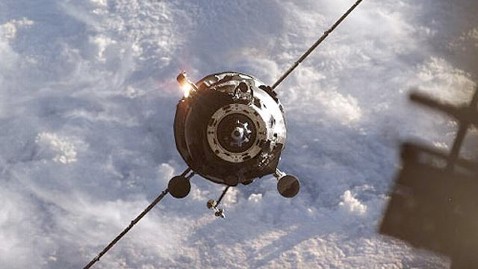Space Junk: NASA Urged to Find Way to Clean Up the Mess

A Russian Progress spacecraft. NASA image.
This is how bad it’s gotten: There is so much man-made space junk orbiting the earth, say the scientists who’ve done the calculations, that even if NASA never launched another rocket, the problem would keep getting worse.
How can that be? A report this week from the National Academy of Sciences offered an answer: “Some scenarios generated by the agency’s meteoroid and orbital debris models show that debris has reached a ‘tipping point,’ with enough currently in orbit to continually collide and create even more debris, raising the risk of spacecraft failures.”
The Air Force Space Command currently tracks 22,000 pieces of space junk — spent satellites, parts of nose cones, booster fragments, pieces that blew free when satellites separated from the rockets that launched them, and so forth. It’s troublesome, expensive, and hard on the nerves for them to watch it all. A couple of times a year they have to call NASA with an alert for the Space Station astronauts to take cover; they move to the Russian Soyuz capsules they use as lifeboats until the danger passes.
How much ought we groundlings to care? We get weather forecasts, GPS readings, TV transmissions, and a fair amount of Internet data via satellite, and while the odds of any one satellite getting pulverized are still low, those things are expensive to replace. The situation was made substantially worse by the Chinese in 2007, who used an old weather satellite for target practice for a military missile. They succeeded — and thousands of shards of satellite are still orbiting the planet every 90 minutes, putting astronauts and other satellites in danger.
What to do? There are no simple answers. DARPA, the Defense Advanced Research Projects Agency, put out a report earlier this year, with all sorts of (forgive the pun) blue-sky ideas about giant nets or magnets in space to catch stuff. DARPA exists to think outside the box, but its principal suggestion was to avoid creating space junk in the first place. It’s a little late for that.